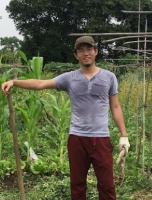Biography
Daren Leung recently completed his PhD thesis “Farming as Method: Contextualising the Politics of Food and Farming in South China” in the department of Gender and Cultural Studies, University of Sydney. His research of food stems from a socio-metabolic account to rethink food politics in relation to the historical transformation of China and the shifting geopolitics in Asia. His works not only appear in the leading journals, like Cultural Studies, China Perspectives, but also show with his collaboration with local food activist groups in Guangzhou, Hong Kong and Sydney.
ResearchGate: https://www.researchgate.net/profile/Daren-Leung
Abstract
The Shapes of Metabolism: Food, Waste and Hygiene in Rural China
The Chinese scholar-activism of agrarian change (e.g. New Rural Construction Movement) has attended to the intellectual heritage of rural China and the revitalisation of “traditional” farming, against the trend of agrarian capitalism. This article will shed new light on the material politics of farming in Mao’s period, particularly via a metabolic account of the ancient farming skill of recycling human waste, or humanure, which has seldom attempted while questioning the socialist rural practice in relation to food, waste and hygiene. Drawing on Marxian notion of metabolism, I conceptualise the technique of humanure as a social practice to signify the relationship between human and soil that questions how we can feed the land that feeds us. In the Chinese context, I also see it as an evolving social practice of how the Chinese peasant transformed “the old” into “the new” to transform the historical material condition of human-land tension in respond to the Cold War geopolitics (e.g., food and agriculture as an ideological battlefield), contrasting with the ways the US’s Green Revolution promoted modern agriculture in other East Asian societies. My argument is based on what I call the “socialist toilet system,” a result of combining two forms of Maoist mobilisation that brought together agricultural productivity and public health of human and the environment. It also traces how it has changed in the reform era, which creates a state of “metabolic chaos” in China today.
Affiliation: Independent researcher

